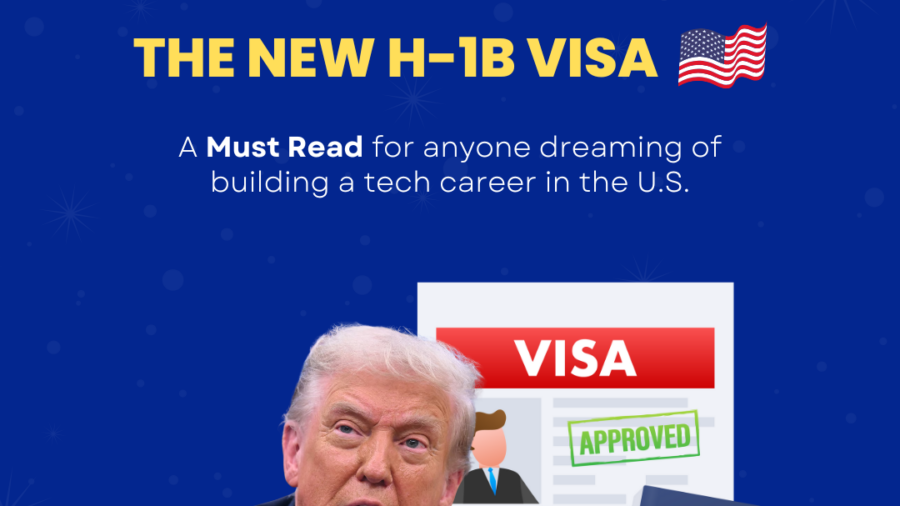The H-1B visa is a U.S. work visa that allows companies to hire highly skilled foreign professionals, mostly in tech, engineering, and research, for specialized roles. For years, it has been the main pathway for global talent (including many Nigerians) to work at leading U.S. tech companies.
However, if you’ve been dreaming about building your tech career in the U.S., the rules of the game just changed, dramatically. On September 19, 2025, President Trump signed a proclamation that now introduces a $100,000 fee for all new H-1B visa petitions filed after September 21, 2025.
As a result, this update has sent shockwaves through the global tech community, and here’s why it matters to you.
Who Gets H-1B Visas?
Before looking at how companies are affected in 2025, it helps to see which types of jobs actually attract H-1B visas.
In FY 2024, most approvals were concentrated in tech and highly specialized fields.
The chart below shows the Top 10 occupational groups of approved H-1B beneficiaries (FY 2024):

Source: U.S. Citizenship and Immigration Services (USCIS), Characteristics of H-1B Specialty Occupation Workers, FY 2024 Annual Report to Congress, April 29, 2025.
What Changed?
- $100,000 Petition Fee
Every new H-1B petition now requires a $100,000 payment, on top of the existing filing fees that already run into thousands of dollars. - Who Is Affected?
- New applicants: If you’re applying for an H-1B for the first time, the new fee applies.
- Current holders: If you already have an H-1B or you’re applying for an extension, you’re safe. The new fee won’t affect you.
- Startups and smaller companies: They’re likely to feel the pinch most, since big tech firms may still absorb the cost.
- New applicants: If you’re applying for an H-1B for the first time, the new fee applies.
- How Long Will It Last?
The proclamation is set for 12 months, but it can be extended. - Why the Change?
The official reason: to ensure H-1Bs go to “highly skilled, highly paid” workers and reduce what the U.S. government sees as misuse of the program.
Where H-1B Talent Comes From
The H-1B program is global, but a handful of countries dominate the approvals.
In FY 2024, just a few countries accounted for the vast majority of H-1B beneficiaries. Unsurprisingly, India led by a wide margin, followed by China, but countries like Canada, South Korea, and Nigeria (the only African country in top 10) are also on the list.

The Scale of H-1B Approvals
To understand how big a deal this is: 106,156 H-1B visas were approved for organizations across the United States in just the first half of 2025 (January–June).
But not all companies sponsor equally. The majority of approvals come from a few big employers. The chart below shows the top 20 companies based on H-1B approvals in the first half of 2025:
Here’s the breakdown:
Companies with the Most H-1B Visa Approvals (First Half of 2025)

Source: U.S. Citizenship and Immigration Services
Why This Matters to Young African Techies
Nigeria, India, and China have consistently been among the top sources of H-1B talent in the U.S. (USCIS data). For many, the H-1B isn’t just a visa, it’s a ticket to global exposure, higher pay, and cutting-edge projects.
But here’s the hard truth:
- The $100,000 barrier means fewer companies will be willing to sponsor new graduates or early-career talent.
- Big tech companies (think Google, Microsoft, Amazon) might still recruit globally, but competition will become even fiercer.
- Startups or mid-sized firms that once looked abroad for talent may now look inward.
What Should You Do?
- Level Up Locally
The U.S. may feel like the end goal, but global opportunities are diversifying. Lagos, Nairobi, and Accra are emerging as tech hubs attracting foreign investment. Sharpening your skills here could open doors beyond the U.S. - Target Remote Work
Remote jobs with U.S. and European companies are still growing. Platforms like Deel, Toptal, and even direct company hires allow you to work for global firms without needing relocation. - Prepare for Tougher Competition
If you still aim for an H-1B, know that employers will be far more selective. Specializing in high-demand fields like AI, cybersecurity, cloud, and data engineering will give you an edge. - Keep Watching the Legal Battles
Lawsuits are already being prepared against the $100,000 fee. If courts block it, the landscape could shift again. Stay informed. Read more stories like this.
Final Thoughts
The H-1B visa has always been a high-stakes game, but this new rule raises the bar higher than ever. For young African techies, the message is clear: don’t wait for opportunities abroad to define your career, build globally relevant skills right here and position yourself for wherever the next wave of demand comes from.

At Dataleum, we are committed to equipping Africans with the skills that make them globally competitive. Our programs are designed to prepare you for opportunities anywhere in the world whether that’s in Silicon Valley, Lagos, or remote roles with global companies.
Enrol in a Dataleum program today and start building the career that travels with you.

